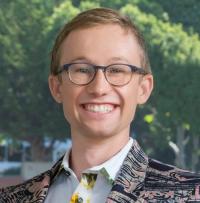
My name is Gabriel Englander and I am very fortunate to have studied economics at The Ohio State University. I graduated in 2015 with a B.S. in economics and minors in math and statistics. When I began at OSU in Fall 2011, I knew I wanted to contribute to efforts to reduce greenhouse gas emissions, but I didn’t know how. I participated in environmental student organizations, but over time I came to feel that I was not an effective activist. It wasn't until I read But Will the Planet Notice?: How Smart Economics Can Save the World by Gernot Wagner that I became interested in studying economics and performing environmental economics research.
Once I made that decision, I was fortunate to find many faculty members who were willing to mentor me. Now that I have a better understanding of how busy faculty are, I am even more grateful to the professors who were willing to advise me even though I had little to offer them in return. My primary research mentors were Katherine Coffman, Noah Dormady, Paul J. Healy, and Douglas Southgate. I also benefited from the advice of Anthony Bradfield, Lucas Coffman, Dan Levin, and Brent Sohngen.
Three experiences in particular set me on my current trajectory of academic research. First, I co-authored a paper with Professor Noah Dormady on one aspect of emissions trading programs. Professor Dormady worked with me even though I had no prior research experience and he did not yet have tenure. Second, Professor Katherine Coffman and Professor Lucas Coffman included me in their year-long experimental economics class, which paired each undergraduate with a graduate student to design, program, and run an economics experiment. This class enabled me to implement an economics experiment of my own for my senior thesis. Professor Katherine Coffman and Professor Paul J. Healy were my generous co-advisors, and I won over $20,000 in Ohio State grants to support my thesis!
OSU faculty gave me excellent advice on applying to graduate school, and in 2015 I began a PhD at UC Berkeley’s Department of Agricultural and Resource Economics. My new colleagues teased me about the “The” in The Ohio State University, and sometimes confused Ohio with Iowa, but I enjoyed Berkeley, nonetheless. In my main “job market” paper, I found that when regulators in Peru try to protect juvenile fish by temporarily closing specific areas of ocean, they inadvertently provide information about the location of schools of fish, resulting in large spillovers that cause the policy to backfire. In another paper, I found that Exclusive Economic Zones (EEZs) protect fisheries from unauthorized fishing, but only in EEZs with fisheries valuable enough to justify enforcement costs. I graduated from Berkeley in 2021, and I won best dissertation awards from the Association of Environmental and Resource Economists and from the Society for Benefit Cost Analysis.
I am currently three-quarters of the way through a one-year postdoc at UC Santa Barbara's Environmental Markets Lab. In August 2022, I will join the World Bank's Development Research Group (DRG). At DRG, I will spend 2/3 of my time on my own research. In the other 1/3, I will provide technical assistance on World Bank projects, which I believe will help me think of research ideas and have meaningful policy impacts.
